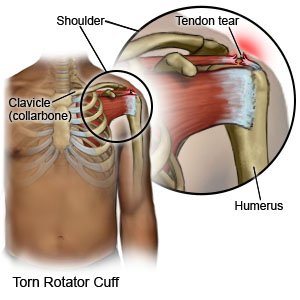Rotator Cuff Tear Repair
Medically reviewed by Drugs.com. Last updated on Aug 4, 2025.
What do I need to know about rotator cuff tear repair?
Rotator cuff repair is surgery to fix a tear in one or more of your rotator cuff tendons. A tendon is a cord of tough tissue that connects your muscles to your bones. The rotator cuff is made up of a group of muscles and tendons that hold the shoulder joint in place.
 |
How do I prepare for surgery?
- Your surgeon will tell you how to prepare for surgery. Tell your surgeon about all medicines you take. Include prescription and over-the-counter medicines. You may need to stop taking some medicines days or weeks before surgery. Your surgeon will give you specific instructions to follow.
- Arrange to have someone drive you home and stay with you to make sure you are okay. You may be given antibiotics to prevent an infection caused by bacteria. You may be given general anesthesia to keep you asleep and free from pain during surgery. You may instead be given anesthesia to make your shoulder area numb. Tell your surgeon if you have ever had an allergic reaction to antibiotics or anesthesia.
- Your surgeon may tell you not to eat or drink anything after midnight on the day of your surgery. He or she will tell you which medicines to take or not take on the day of your surgery.
Related medications
What will happen during surgery?
The tear can be repaired in several ways. Your surgeon will talk to you about the different kinds of surgery. He or she will tell you the kind that is best for you. This will mainly depend on the kind of tear you have and if it is severe.
- For an open repair or a mini-open repair , your surgeon will make an incision in your shoulder. An open repair may be needed if the tear is large or you need a tendon transfer. You may be able to have a mini-open repair if the tear is small and your surgeon can repair it easily. For either kind of open repair, your surgeon will examine the tendons.
- For arthroscopy , your surgeon will make small incisions in your shoulder. He or she will put an arthroscope (a camera) into the joint. The camera will show pictures of your joint on a monitor. Your surgeon will put tools into other small incisions in the area. He or she will use the tools to repair the rotator cuff tear.
- Your surgeon may need to do several things during any kind of surgery. He or she may remove damaged tissue, bone spurs, or a swollen bursa (small sac of fluid around the joint). If the rotator cuff tear is small, he or she may sew it back together. If the tear is big, he or she may attach the tendon to the bone in your shoulder. This can be done with stitches and bone anchors to hold the tendon to the bone. A graft (a piece of another muscle or tissue) may be used to attach and repair the tendon. Your surgeon may reshape your shoulder bone to help it stay in place.
- Stitches may be used to close the incision. The wound will then be covered with a bandage.
What should I expect after surgery?
- You should expect to feel pain after surgery. This is normal and should get better soon. You will be given pain medicine. Your healthcare provider may also put ice or a cold pack on your shoulder. This treatment may decrease pain, swelling, and muscle spasms.
- A sling may be placed on your arm to keep it from moving. A pillow attached to the sling holds your arm away from your body. This position decreases pressure on the surgery area. It also helps blood flow to the area to help it heal.
What are the risks of rotator cuff surgery?
You may get an infection from this surgery or bleed more than expected. You may have nerve damage. If you had an open repair, the muscle that was detached at the beginning may not reattach correctly. Rotator cuff surgery may cause muscles in your shoulder to become weak. This can decrease your ability to use your shoulder. Your tendon may not heal, and your arm and shoulder may be weak and painful. If a graft was used for your repair, you may have swelling and get an infection around the graft. After surgery, tissue around the joint can swell and become stiff. This can cause new pain and problems with moving your arm. The anchor used to fix your tear may press on the tendon and cause pain. Your tendon may tear after surgery. You may need to have surgery again if the new tear causes pain or movement problems.
Care Agreement
You have the right to help plan your care. Learn about your health condition and how it may be treated. Discuss treatment options with your healthcare providers to decide what care you want to receive. You always have the right to refuse treatment. The above information is an educational aid only. It is not intended as medical advice for individual conditions or treatments. Talk to your doctor, nurse or pharmacist before following any medical regimen to see if it is safe and effective for you.© Copyright Merative 2025 Information is for End User's use only and may not be sold, redistributed or otherwise used for commercial purposes.
Further information
Always consult your healthcare provider to ensure the information displayed on this page applies to your personal circumstances.
